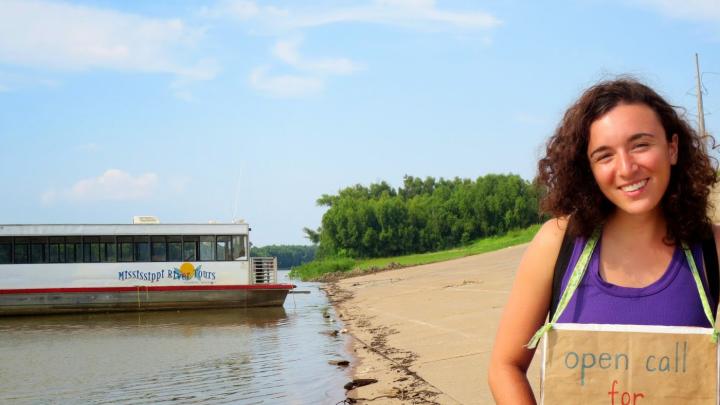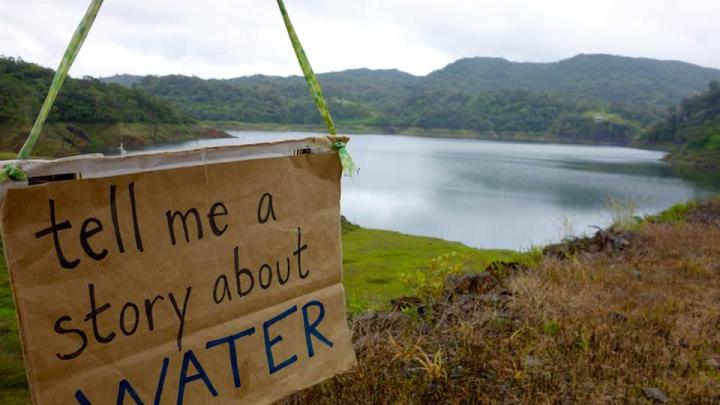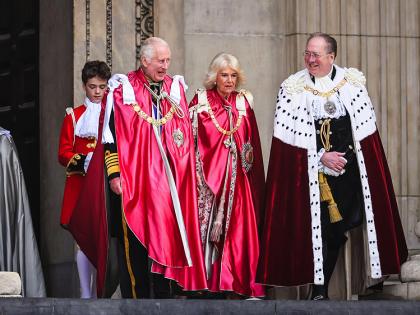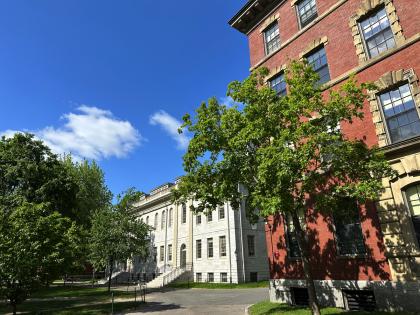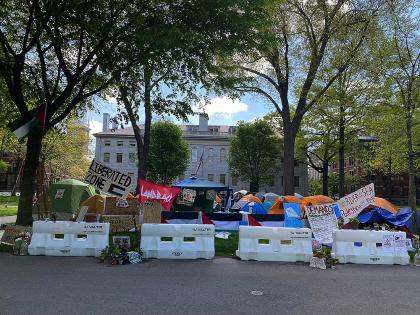Leo and I sit across the table from each other in the home his family rents in Dunedin, New Zealand. The kitchen smells of roast garlic. Two days ago I cycled up the big hill to his house with all my belongings strapped and clipped to my bicycle: clothes, food, audio recorder, and a tiny guitar.
Over a shared meal of roasted vegetables, Leo and I start chatting. Leo and his family relocated to Dunedin from Ireland a few years ago—his partner and I met through friends of friends on Facebook. The topic of climate change comes up.
“People look away because it’s hard to get your head around the scale of the problem,” Leo says, pausing with a piece of pumpkin on his fork. “But you’re choosing to look.”
I am.
For the last year 14 months I have been traveling in the United States, Fiji, Tuvalu, New Zealand, and Australia—mostly by bicycle and boat—to collect 1,001 stories from people I meet about water and/or climate change. To date, I’ve made 443 audio recordings, each a unique story that someone has told me along the way.
In March 2015, after speaking with climate activist Chris Watson, author of Beyond Flying, in Wellington, New Zealand, I made the decision to renounce air travel to reduce my environmental footprint. Flying is by far the worst thing that many of us do for the planet; calculate your own environmental footprint at: http://footprint.wwf.org.uk/
As a result, I crossed the Tasman Sea twice by cargo ship—crowd-funding both legs with support from people who believe in my writing—and almost hitched a ride to Indonesia on a yacht. In between these ocean crossings, I biked 2,100 miles up the east coast of Australia, from Melbourne to Townsville, and added 90 stories to my archive-in-progress.
As with most good journeys, there are no straight lines.
It was a great privilege to begin this trip with support from Harvard’s Gardner & Shaw Postgraduate Traveling Fellowship for a year of “purposeful wandering.” My goal is to use this opportunity to be an activist for a cause that I believe in. There are as many ways to be an activist as there are people on the planet. Listening is a form of activism—holding a space for a story to be told, face-to-face, slowly, in a culture that values productivity over slowness, screen-time over verbal storytelling sessions, feels revolutionary. While water and climate change are the starting points of many conversations with storytellers, they don’t necessarily end there. The personal is political is environmental. It’s all intertwined.
I am now supporting myself on the road through writing and other creative projects. If you’d like to be a part of helping me on my way, visit: www.patreon.com/devi_lockwood.
I arrived at Harvard thinking I would study English, given my love for reading and writing poetry, but Deborah Foster’s Freshman Seminar, “The Art of Storytelling,” changed that plan. I will always be a poet, but in Folklore & Mythology I found a discipline that made life worth living, that changed the color of the conversations around me. Suddenly the everyday stories I heard from my friends in Annenberg dining hall or from family around the Thanksgiving dinner table were ways of constructing our identities in real time, of creating and defining our “group”—of giving life to a shared meal.
As a student of Folklore & Mythology, I learned how to listen more closely and how to tell stories in a way that engages the listener. I learned that, as folklorist Keith Basso explains, “Wisdom sits in places.” Stories, in other words, are intimately linked to the landscape in which they are told. I read widely and encountered versions of Snow White and Little Red Riding Hood that surface in cultures worldwide. Stories have a way of crossing borders—once told, a tale belongs to us all.
At Harvard I also learned the basic techniques of ethnography, how to establish trust with a storyteller and to respect a story for what it is: a gift to the listener. “Some stories shoot through you like arrows,” Professor Foster taught us. I learned to make high quality audio recordings using a Sony M-10 and to edit sound in ProTools.
The important thing, I believe, is to listen. To listen wholly. To listen without judgment—so few people do.
At some point I decided I wanted not only to study great stories, but to live one.
Many of my ’14 classmates are off beginning lucrative careers in tech in San Francisco, finance in New York City, or some combination of the two in Boston. I have never been good at staying still, at being tethered to a desk. I dance barefoot in public places. I listen. I cycle. I record. I write. At some point in my life I will be more stationary—my life goal is to become an old woman with long, curly hair and a vegetable garden—but for now I am in love with movement. Movement is the language I come from.
I’ll be the first to say that being a peripatetic poet is exhausting at times. I don’t have a plan or a routine, two pillars that grounded me as a varsity athlete at Harvard, and in all my prior schooling. Purposeful wandering is a completely new and challenging way of being. It has been liberating to burn the maps and schedules I once found so comforting. I take experiences as they come. I am enmeshed in the richness of the present.
My current work draws inspiration from a solo bike trip I took down the Mississippi River in August 2013; I cycled 800 miles from Memphis, Tennessee to Venice, Louisiana, following the river to its mouth at the Gulf of Mexico. Along the way I made more than 50 hours of audio recordings of stories people told me. For my senior thesis, I wrote poems inspired by those stories. The Harvard Arts Council supported that trip with an Artist Development Fellowship, for which I am extremely grateful. I look back on that time as a turning point in my practice as a poet/storyteller. Cycling is a medium I deeply love—a way of moving through a landscape and breathing it in, a way of hallowing hills. Perhaps most importantly, the bicycle is a way of connecting with the people I meet when I arrive. “Where are you going? What are you doing? Why are you alone?” people ask. The conversation unfolds from there.
When folks are comfortable, I record their stories. The plan down the line is to make a map on a website where you can click on a point and listen to a story someone from that place has told me. I am also in the process of writing a book proposal. I believe in the power of people. In the words of Professor Laurel Thatcher Ulrich: “The world is made by people acting in it.”
It’s 2016 and here we are: interconnected and faced with the reality of a climate crisis. The time to act is now.
I will leave you with two stories that I collected recently:
The first from Kiwi climate activist Dylan Grimwood, who sat in trees from 2008 to 2013 in Tasmania to protest the logging of some of the last remaining old-growth forests on the planet.
The second from Professor James Higham of the University of Otago in Dunedin, New Zealand, who studies the gap between attitudes and behavior with regards to tourism, work, flying, and climate change.
~
If there’s one thing that I wish for my university, it is that it divests from fossil fuels. Keep it in the ground. It will be infinitely more valuable for future generations to invest in our collective health as a species rather than in quick and dirty profit margins.
It is a massive privilege to have attended this fine institution, and we have an obligation to use our learning for good—or at the very least not to muck up the planet in the process of living. How many planets would we need if everyone on the earth lived exactly as you do? It takes everyone to change everything. I urge you to be critical of your privilege, of your day-to-day life. The legacy we leave matters.
There are 1,001 ways to be an activist. Listening is the path I have chosen. What does activism look like for you?
